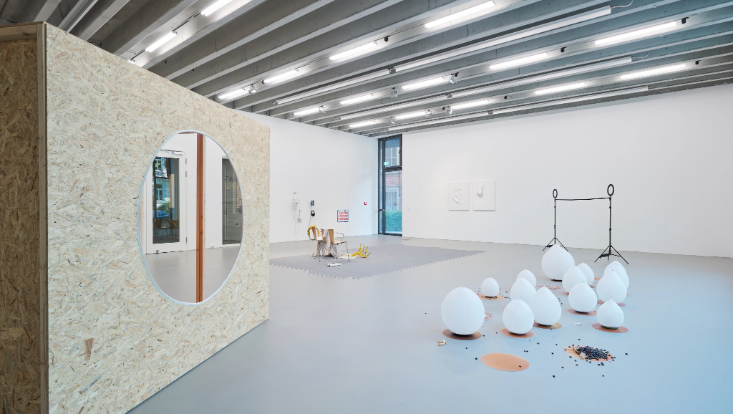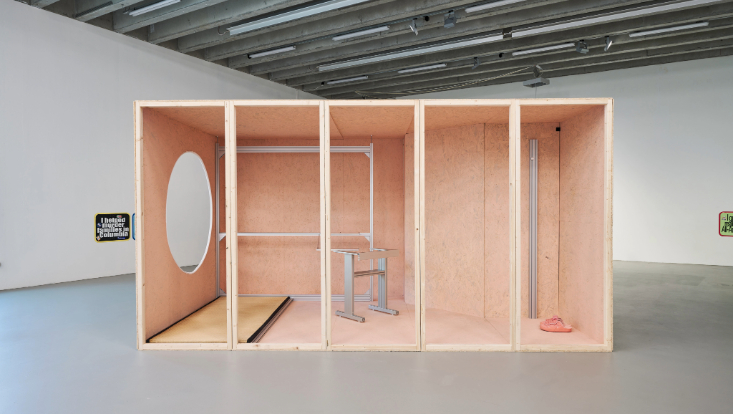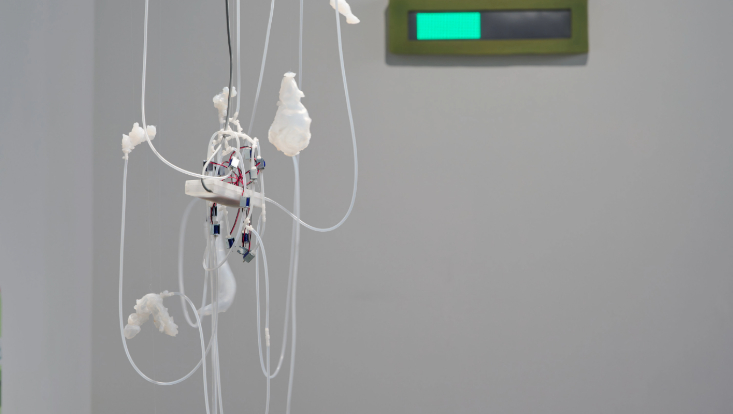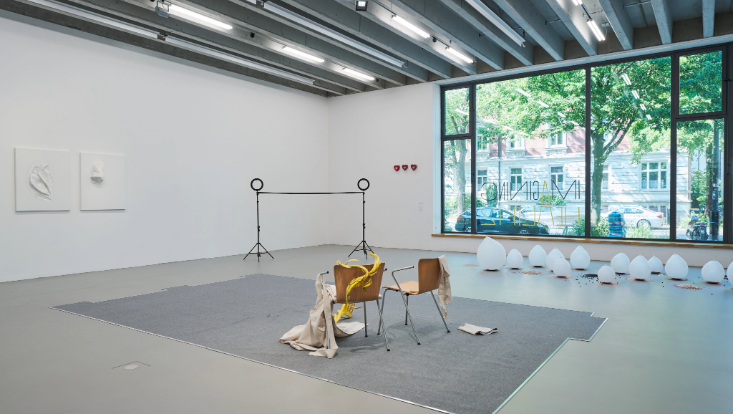Imagining Health 2: Continued collaboration with HFBK
1 June 2023

Photo: UHH/Inci
Building on the successful Imagining Health I exhibition in 2022, this second collaboration between the HFBK Hamburg and Centre for the Study of Health, Ethics, and Society (CHES) at the University of Hamburg (UHH) aimed to further enhance the exchange of ideas and perspectives between artists and historians by continuing to explore how health and medicine might be imagined in artistic practice, thereby creating a space where the humanities and creative and fine arts can mutually inspire one another. Following a call for applications in January of 2023, artists submitted works that interpreted the meanings of 'medicine' and 'health' from different angles.
The exhibition series, funded by CHES, was coordinated by Professor Martin Köttering, President of HFBK, and Professor Ulf Schmidt, Nucleus Professor in Modern History at UHH. It was organized and curated by Sjusanna Eremjan from HFBK and Dr. James Farley from CHES, with support and interviews with contributing artists conducted by Dr. Kate Docking, Dr. David Peace, and Dr. Will Studdert, all from CHES. The overview chapter of the exhibition was authored by Dr. Kate Docking and Dr. David Peace, with art historical contextualisation provided by Dr. Katja Schmidt-Mai of UHH.

The participating artists are Kyle Egret, Leo Elia, Matthis Frickhœffer, Benjamin Janzen, Jori Kehn, Sebastian Kommer, Andrea Laušević, Flora Fee Mayrhofer, Christiane Mudra, Juan Ricaurte-Riveros, Lea van Hall, Faun Vium.
The projects displayed explored themes such as bodily treatment, mental health, recovery, harm, growth, and human enhancement, utilising a variety of artistic mediums including music, performance, sculptural practice, digital screens, film, sound, and objects to critically examine the role of medicine within society based on their own experiences, community events, and environmental changes. Prior to the exhibition, historians at the University of Hamburg interviewed the artists to discuss their work, and how they interpreted the theme of Imagining Health building on the insights collaboratively gained from Imagining Health I.

During these conversations three broad themes emerged: Performance Society, the Wounded Body and Mind, and Health Technologies. The discussion explored these themes as the artists, through their work, sought to demonstrate the entanglements between body and mind in trauma and healing, the detrimental impacts of result-driven societies on physical and mental health, and the benefits and dangers of health technologies. The interviews facilitated a fruitful interdisciplinary exchange of ideas between the artists of the HFBK and CHES researchers that combined historical context with artistic perspectives to better understand the external forces that have directly impacted bodily and mental health in different local and global contexts - with a particular focus on the importance of environmental and social factors, political conflict, and living space.

The exhibits featured a variety of artistic mediums including soundscapes, performance, sculpture, digital screens, and film. A wide variety of materials were utilised for the projects, such as steel, paper, wax, ceramics, wood, fabric, silicone, latex, and organic material. Pieces encouraged reflection on the stigmatisation of mental illness and the impact of a 'performance society' on the body and mind, the aesthetics of wounds and healing, the imperfectability of the body, and the fact that bodily healing is not a linear process. They also considered the personal impact of bodily trauma and the dangers attached to health technologies, and challenged viewers to consider how we might navigate the tensions between technological innovation and its potentially negative societal impacts. The commercial aspects of medical developments and the impact of pharmaceutical advertising on health and lifestyle choices were also highlighted. Imagining Health II furthered its predecessor's innovative, transdisciplinary approach to the complex intersections between medical practice, health technologies, individual autonomy, and societal wellbeing, offering new perspectives on the diverse relationships between medicine and society.

The Imagining Health exhibition series continues to strongly resonate with the Taming the European Leviathan project hosted at CHES in partnership with institutions in Berlin, Sofia, and Budapest. Leviathan takes medicine as a lens to develop a common history of post-war Europe. As the project reaches its half way point, the Imagining Health exhibition series has inspired CHES researchers to consider different transdisciplinary perspectives within themes such as medical ethics, human experimentation, human enhancement research, eugenics, bioscience, reproductive policies, and public health campaigns.
https://www.hfbk-hamburg.de/en/projekte/imagining-health-art-health-and-history/
